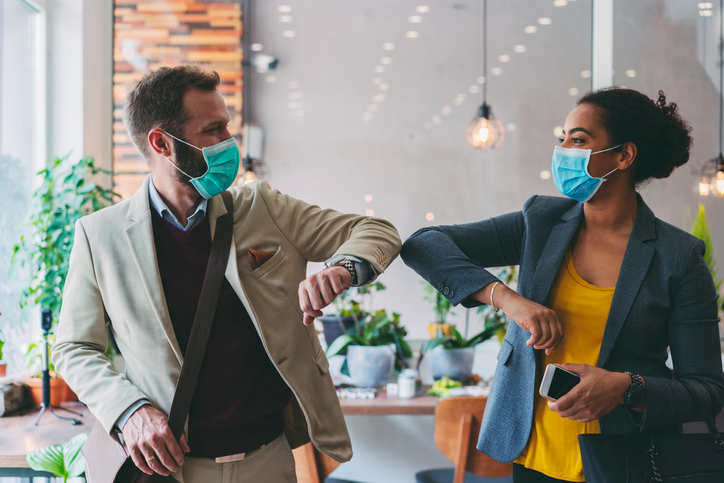
As if hiring and interviewing were not hard enough. COVID-19 has necessitated additional layers of planning, safety precautions, technology needs and potentially awkward conversations for both employers and candidates.
While many companies are able to conduct virtual interviews during these unusual times, and even start new employees in a virtual workplace, others need to conduct in-person interviews and/or have employees work in an office setting. As an employer, before you dive into face-to-face interviews, here are some important recommendations to consider.
- Educate Yourself and Your Team. Consult with and familiarize your team members with current OSHA and CDC COVID-19 guidelines. Keep in mind that these change as new information becomes available, so it is important to keep everyone up to date.
- Set Company-Wide Protocols. If you have not already developed extensive COVID-related protocols and contingency plans for your company, please do so ASAP. With the above information, these may need to be revisited and updated. In addition to company-wide protocols for employees, have a policy for interviewing and on-boarding new employees. (We’ll talk about consistent protocols for employees and candidates in a little while.)
- Clearly Communicate Protocols + Expectations With Candidates. Let people know what the plan is throughout the interview process, including what will be done in person and what safety precautions you take for candidates and employees. Consider including the need for an in-person interview or office work environment in your job description so people can self select in or out according to their needs and comfort level. Doing this will respect everyone’s time and choices before you get too far down the road.
- Respect Everyone’s Comfort Level. Everyone has their own set of personal considerations when it comes to choices around safety in a pandemic. Encourage candidates to voice any concerns and accept in-person interviews only if they’re entirely comfortable. Be open-minded about considering and accommodating candidates who are not comfortable with in-person interviews for roles that can be remote during these unusual times. Remember, this is not a typical situation, nor is it permanent. Short-term flexibility and long-term thinking can go a long way in making a great hire.
- Be Creative With Virtual Interviews. If you are on the fence about the need for an in-person interview, identify what would be missed and come up with other ways to get that intel. Wherever possible, we recommend you err on the side of safety and create new ways to get to know each other virtually. There are lots of good digital ways for candidates to express themselves, and companies to show their culture, including having candidates do virtual presentations, or offering virtual tours of the parts of your facilities that are open.
- Carefully Plan Your In-Person Interviews. If you decide that in-person interviews are essential, take safety precautions (i.e. meeting outdoors, wearing masks, etc.), even if that is not what you are practicing. This will help you honor the candidates and reduce your liability should someone get sick soon after the interview.
- Delicately Assess Safety Habits Around COVID-19. Employees at many smaller companies work together in an office, yet have a great deal of trust in their co-workers’ COVID safety habits when they leave the office. But what happens when a new employee is added to the mix? How can the current team find out if a candidate is taking the same precautions to keep everyone safe, while not asking potentially discriminatory questions? Here are a few ideas:
- Have a consistent “COVID policy” in place that everyone lives by and then ask questions of candidates accordingly. For instance, “At our company we ask that all of our employees work in the office together and commit to (list specific safety habits) when they leave the office so that we all stay safe. Would it be a problem for you to follow these same precautions?” Clearly state what behavior is acceptable and what is not — what your company considers jeopardizing employee’s health — and apply these standards consistently across everyone.
- As mentioned above, base your policy on expert opinions and guidelines, versus personal perceptions or opinions.
- Having an open dialogue with a candidate about their comfort with an in-person interview and watching their habits during the interview will give you some intel on their general habits.
- Avoid asking questions that have the potential to be seen as digging for information that could be considered grounds for discrimination (i.e. anything about having kids or marital status or political/religious affiliation, etc).
- Consider having a new employee start work from home for a short period of time (i.e. two weeks) before they come into the office to work.
As you navigate your way through the uncharted waters of safely interviewing and hiring during a pandemic, remember four basic guidelines: Get the facts; be respectful of each other; communicate openly; and be flexible and creative to achieve your goals.




